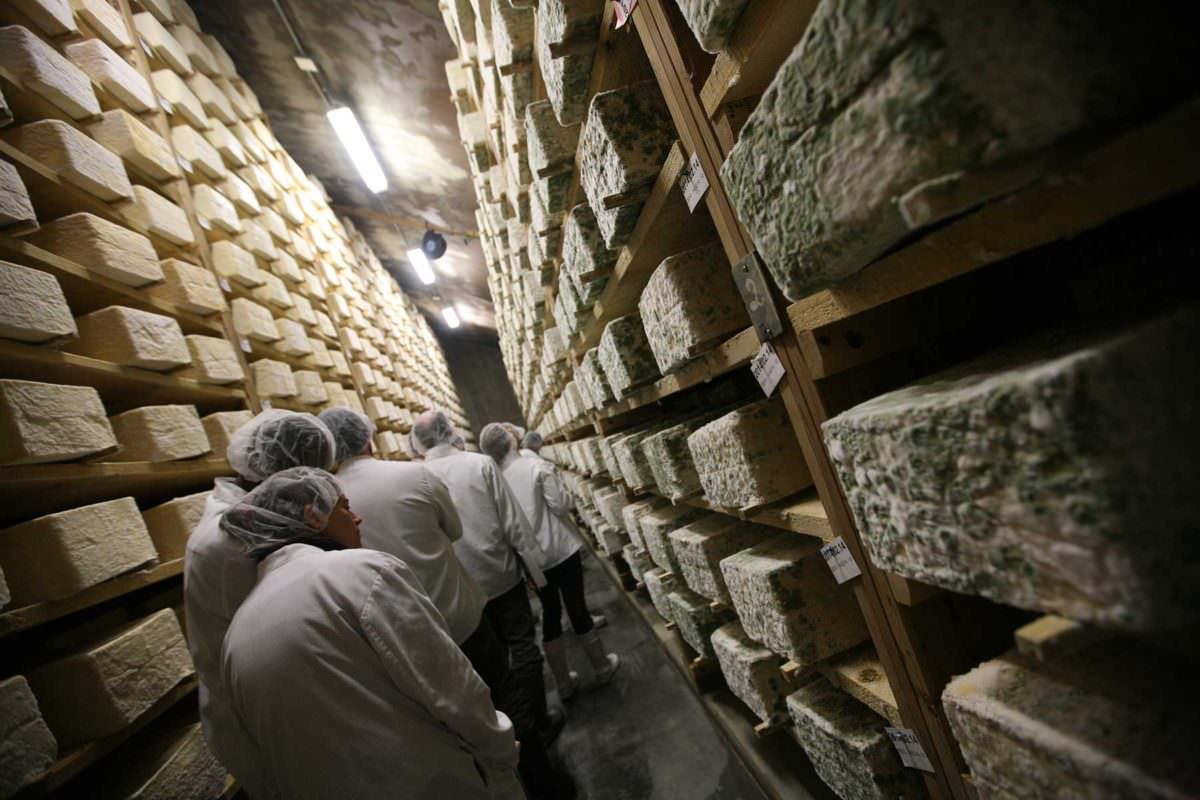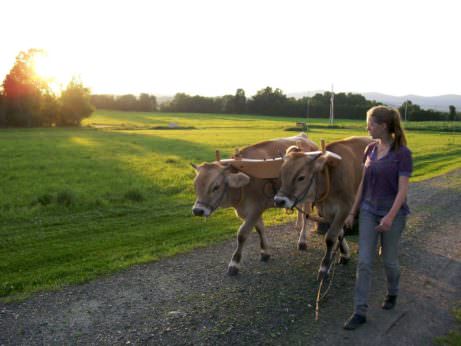Sponsored: School of the New American Farmstead: Taking Your Passion for Farming, Food, and Community to the Next Level
Sterling College is at the center is part of a major revolution in food systems.
Sponsored: School of the New American Farmstead: Taking Your Passion for Farming, Food, and Community to the Next Level
Sterling College is at the center is part of a major revolution in food systems.

Here is a place of innovation, and an important center for a revolution in food systems, with the world-renowned Cellars of Jasper Hill, High Mowing Seeds, the Center for an Agricultural Economy, Vermont Soy, and Hill Farmstead Brewery all making their home here.
Alumni of the courses point out how the program gives their passion for food and farming the time and space they deserve.
At the center of this Vermont movement to reshape local food and farming is Sterling College. Its picturesque campus, with draft horses, sheep, and chickens thriving on its 400+ acres of farm, forest, and gardens, is a living laboratory to tackle the big questions of the 21st century: how does one farm without exacerbating climate change? And how can the nation transform its food system into one that is fair, just, and sustainable?
“Creating an equitable and sustainable food system is impossible without community-minded entrepreneurs and local, human-scale farms,” said Nicole Civita, assistant director of the Rian Fried Center for Sustainable Agriculture & Food Systems at Sterling College. “To build food system resilience, we need to cultivate and repurpose traditional skills and educate people who are interested in ecological farming, small-scale food production, and nourishing their own communities.”
Sterling College has been examining the links between agriculture, food, and the environment for over 40 years, and has opened up its ecologically-minded curriculum for lifelong learners with its School of the New American Farmstead.
School of the New American Farmstead

“In Vermont, farms aren’t seen as elite institutions; they’re part of life already,” said Ruth Reichl, renowned food writer and editor, and former School of the New American Farmstead instructor. “So [Vermont], probably more than any other state, is really in a position to integrate the farm economy into people’s everyday lives.”
The experiential approach to these courses will engage students’ senses and impart techniques perfected by some of the world’s most skilled ecological farmers and artisanal food producers. The School of the New American Farmstead has celebrated instructors for its courses this summer, including Ivan Larcher, Pandora Thomas, Jean Martin Fortier, Tradd Cotter, David Asher, Pascal Baudar, Sandor Katz, Michael Phillips, and more.
Summer 2017 Courses
Courses include: “The Art of Natural Cheesemaking,” “Social Permaculture,” “Wholesome Whole-Wheat Pastry,” “Ecological Orcharding,” “Holistic Animal Husbandry,” “Small-Scale Dairying,” “Small-Batch Brewing,” “The Art of Fermentation,” “Working Animals, Working Landscape” and “Market Gardening: Intensive Crop Production.”
Alumni of the courses point out how the program gives their passion for food and farming the time and space they deserve. Jessica Keahy, the founder and cheesemaker of Sweet Freedom Creamery in Fayetteville, Arkansas, is an alumna of the “Fundamentals of Artisan Cheese” class taught in conjunction with the Cellars at Jasper Hill.
She said of the course, “There’s nothing like it in the U.S. I was looking for the next step; there were very few classes offered in the U.S. that were really in-depth. I wanted to make sure I was getting my money’s worth, but it’s exactly what I was looking for!”
Stacey Clinesmith said of her time in the course “The Art of Fermentation” with Sandor Katz, “Not only did I get a chance to learn some new tips and techniques for fermented foods I’ve been making for years, like sauerkraut and kimchi, I got to learn how to make a whole host of other fermented foods I’d never tried before.”
She continued, “And, I got to learn about all of it from a man whose books I’ve loved and whose advice I’ve relied upon since I made my first batch of kraut. Having the opportunity to work alongside someone I have admired from afar was just as special and delightful as I’d hoped.”
But these courses aren’t just about building a new career or hobby. It’s about giving students the tools to farm or produce food in ways that are sustainable and just. Jan Paul, one of the instructors for the class “Small-Batch Brewing,” said, “The ecological approach to artisan food that the School of the New American Farmstead promotes is completely in line with my brewing practices.”
He continued, “I am grounded by a strong environmental ethic, and so is this program.”
Learn more about the classes at the School of the New American Farmstead and how to register at www.sterlingcollege.edu/modernfarmer.
Check out previous editorial coverage of Sterling College on ModernFarmer.com here.
Follow us

This work is licensed under a Creative Commons Attribution-NoDerivatives 4.0 International License.
Want to republish a Modern Farmer story?
We are happy for Modern Farmer stories to be shared, and encourage you to republish our articles for your audience. When doing so, we ask that you follow these guidelines:
Please credit us and our writers
For the author byline, please use “Author Name, Modern Farmer.” At the top of our stories, if on the web, please include this text and link: “This story was originally published by Modern Farmer.”
Please make sure to include a link back to either our home page or the article URL.
At the bottom of the story, please include the following text:
“Modern Farmer is a nonprofit initiative dedicated to raising awareness and catalyzing action at the intersection of food, agriculture, and society. Read more at <link>Modern Farmer</link>.”
Use our widget
We’d like to be able to track our stories, so we ask that if you republish our content, you do so using our widget (located on the left hand side of the article). The HTML code has a built-in tracker that tells us the data and domain where the story was published, as well as view counts.
Check the image requirements
It’s your responsibility to confirm you're licensed to republish images in our articles. Some images, such as those from commercial providers, don't allow their images to be republished without permission or payment. Copyright terms are generally listed in the image caption and attribution. You are welcome to omit our images or substitute with your own. Charts and interactive graphics follow the same rules.
Don’t change too much. Or, ask us first.
Articles must be republished in their entirety. It’s okay to change references to time (“today” to “yesterday”) or location (“Iowa City, IA” to “here”). But please keep everything else the same.
If you feel strongly that a more material edit needs to be made, get in touch with us at [email protected]. We’re happy to discuss it with the original author, but we must have prior approval for changes before publication.
Special cases
Extracts. You may run the first few lines or paragraphs of the article and then say: “Read the full article at Modern Farmer” with a link back to the original article.
Quotes. You may quote authors provided you include a link back to the article URL.
Translations. These require writer approval. To inquire about translation of a Modern Farmer article, contact us at [email protected]
Signed consent / copyright release forms. These are not required, provided you are following these guidelines.
Print. Articles can be republished in print under these same rules, with the exception that you do not need to include the links.
Tag us
When sharing the story on social media, please tag us using the following: - Twitter (@ModFarm) - Facebook (@ModernFarmerMedia) - Instagram (@modfarm)
Use our content respectfully
Modern Farmer is a nonprofit and as such we share our content for free and in good faith in order to reach new audiences. Respectfully,
No selling ads against our stories. It’s okay to put our stories on pages with ads.
Don’t republish our material wholesale, or automatically; you need to select stories to be republished individually.
You have no rights to sell, license, syndicate, or otherwise represent yourself as the authorized owner of our material to any third parties. This means that you cannot actively publish or submit our work for syndication to third party platforms or apps like Apple News or Google News. We understand that publishers cannot fully control when certain third parties automatically summarize or crawl content from publishers’ own sites.
Keep in touch
We want to hear from you if you love Modern Farmer content, have a collaboration idea, or anything else to share. As a nonprofit outlet, we work in service of our community and are always open to comments, feedback, and ideas. Contact us at [email protected].by Sterling College, Modern Farmer
January 18, 2017
Modern Farmer Weekly
Solutions Hub
Innovations, ideas and inspiration. Actionable solutions for a resilient food system.
ExploreExplore other topics
Share With Us
We want to hear from Modern Farmer readers who have thoughtful commentary, actionable solutions, or helpful ideas to share.
SubmitNecessary cookies are absolutely essential for the website to function properly. This category only includes cookies that ensures basic functionalities and security features of the website. These cookies do not store any personal information.
Any cookies that may not be particularly necessary for the website to function and are used specifically to collect user personal data via analytics, ads, other embedded contents are termed as non-necessary cookies.